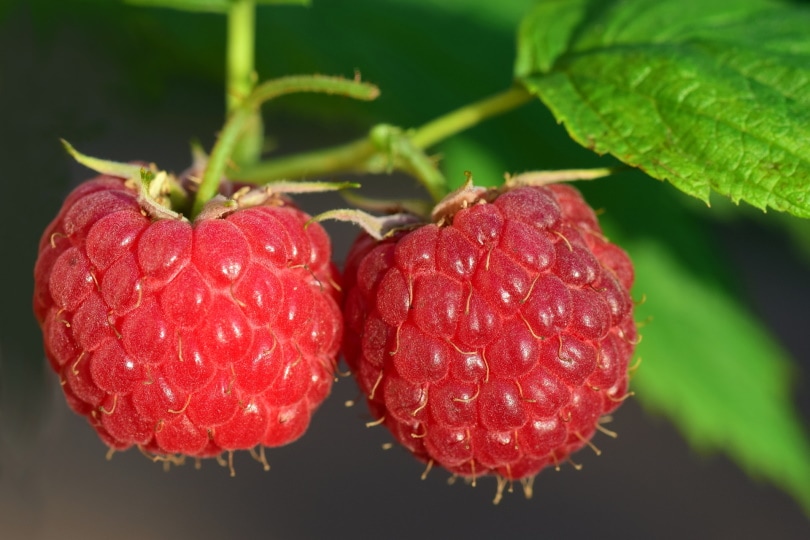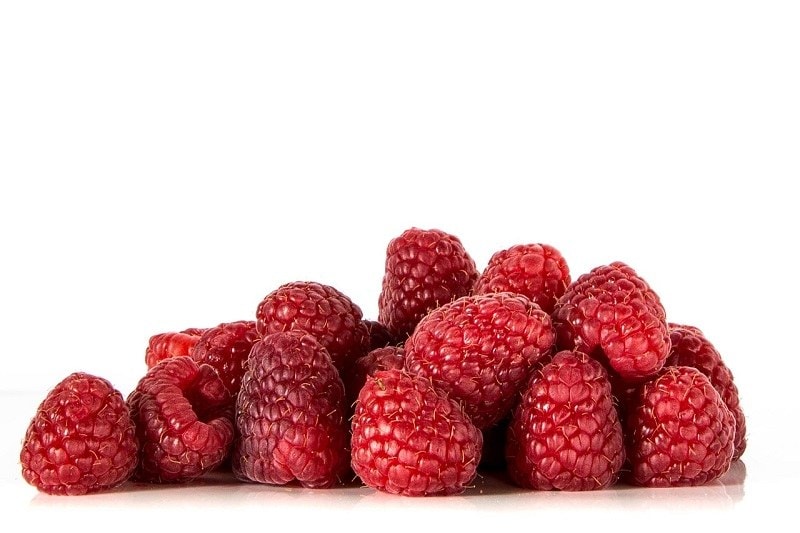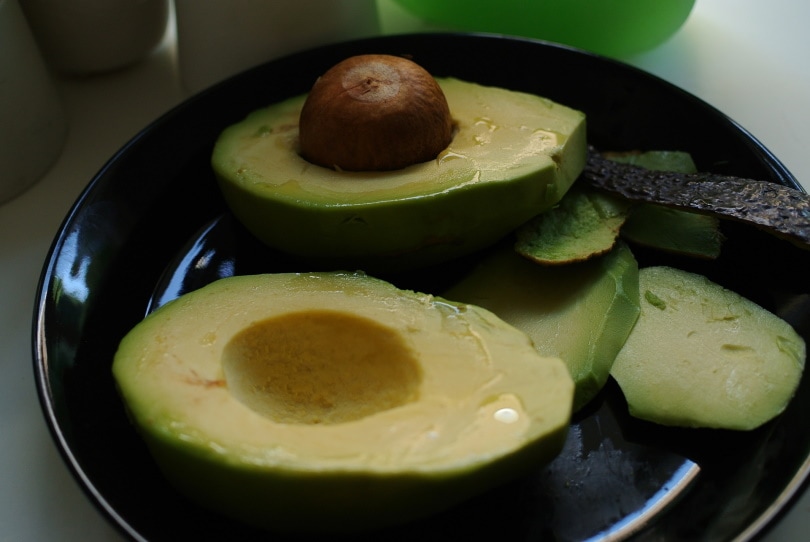Click to Skip Ahead
Although dogs are facultative carnivores, many enjoy snacking on fruits and veggies and they can provide additional health benefits. However, it can be tricky for dog parents to remember which fruits are entirely safe for canines. For example, can dogs eat raspberries?
The simple answer to this question is yes, dogs can eat raspberries, albeit in moderation.
In this article, we go over whether these fruits are safe and healthy for our canines and more!
Are Raspberries Good for Dogs?
Although raspberries are not typical dog treats, these fruits can offer some benefits to canines when fed in moderation. Dogs that have a well-balanced diet don’t need raspberries for their nutritional value, but these fruits can still provide nutrient benefits that your dog’s body will appreciate.
- Vitamins A, E and K
- Calcium
- Potassium
- Folate
- Manganese
- Magnesium
- Iron
These fruits also contain antioxidants and can potentially affect a dog’s overall health by improving digestion, lowering inflammation, and reducing the chances of diseases like diabetes, cancer, and arthritis. (These benefits are extrapolated from human research and need to be clarified in dogs.)

Potential Dangers of Feeding Raspberries to Your Dog
While raspberries can provide numerous benefits, is there something else that you should know before giving these fruits to your canine?
Raspberries contain very small amounts of a natural sweetener known as xylitol. This is found in many other foods, fruits, and veggies, and while it’s safe for human consumption, xylitol is toxic to dogs, which is why some people recommend you should be cautious with raspberries.
Xylitol is toxic to dogs and they can start to have effects of low blood sugar levels at around 1g of xylitol per 10kg weight of dog.1 Higher doses can result in life threatening liver failure. This is more usually a problem encountered when dogs eat products containing higher amounts of xylitol such as chewing gum. A 10kg dog eating around 2.5kg of raspberries would be in danger of developing low blood sugar due to the xylitol. So a few raspberries here and there as a treat should be just fine.
Should Dogs Eat Raspberries? Are They Safe to Eat?
Generally speaking, dogs don’t need raspberries if they’re already getting a well-balanced, high-quality diet. Still, when eaten in moderation, raspberries can be a healthy treat or additional topper. That said, dogs should only eat these fruits in small amounts.
Provided your dog doesn’t consume large quantities of raspberries in one sitting they should avoid problems with xylitol toxicity. If you have any worries about how many your dog has eaten you should contact your veterinarian for advice.
PangoVet. It’s an online service where you can <b>talk to a vet online</b> and get the personalized advice you need for your pet — all at an affordable price!
</p>
<div class="su-button-center"><a href=https://www.dogster.com/dog-nutrition/"https://pangovet.com/?utm_source=dogster&utm_medium=article&utm_campaign=dog_eat_drink%22 class="su-button su-button-style-default" style="color:#FFFFFF;background-color:#FF6600;border-color:#cc5200;border-radius:9px;-moz-border-radius:9px;-webkit-border-radius:9px" target="_blank" rel="nofollow"><span style="color:#FFFFFF;padding:0px 24px;font-size:18px;line-height:36px;border-color:#ff944d;border-radius:9px;-moz-border-radius:9px;-webkit-border-radius:9px;text-shadow:none;-moz-text-shadow:none;-webkit-text-shadow:none"> Click to Speak With a Vet</span></a></div></div></div>"}" data-sheets-userformat="{"2":513,"3":{"1":0},"12":0}"> If you need to speak with a vet but can’t get to one, head over to PangoVet. It’s an online service where you can talk to a vet online and get the personalized advice you need for your pet — all at an affordable price!

How Many Raspberries Should Dogs Eat?
Raspberries can make excellent healthy treats for dogs, but since dogs are facultative carnivores, their primary food source should be meat, and treats should only count for 5 to 10% of your dog’s diet.
When it comes to feeding raspberries to a dog as a snack, here is a guideline to follow.
| Dog Size and Weight | Raspberry Serving (Suggested Number) |
| Extra-small dogs (2–20 pounds) | One to two raspberries |
| Small dogs (21–30 pounds) | Two to three raspberries |
| Medium dogs (31–50 pounds) | Five to six raspberries |
| Large dogs (51–90 pounds) | A small handful of raspberries |
| Extra-large dogs (90+ pounds) | Handful of raspberries |
Remember that these are general guidelines as it is not recommended to feed raspberries every day but rather on occasion as part of a nutritionally balanced diet.
What Would Happen If Your Dog Ate More Raspberries Than What’s Considered Normal?
Raspberries are not toxic to dogs, but they do contain xylitol, which is toxic for dogs when consumed in excess. If your dog eats the recommended number of raspberries, there shouldn’t be any issues. But if your dog ingests more raspberries then the most likely consequence is an upset stomach. If you have any concerns about your dog’s health you should contact your veterinary clinic for advice.

Frequently Asked Questions
How Can You Safely Feed Raspberries to Your Dog?
If you decide to feed raspberries to your dog, you need to know how to do it safely to prevent any problems. Here’s a list of things that you should do:
- Wash the raspberries before giving them to your dog, and remove their leaves and stems.
- For small dogs, cut the raspberries into chewable pieces to prevent choking hazards.
- If your dog is a picky eater, consider adding the raspberries to their regular meals, or mixing them with other fruits to make a dog-friendly treat.
Which Fruits Are Also Safe for Dogs?
It’s always beneficial to know which fruits besides raspberries are also safe for dogs.
- Bananas
- Apples (seeds removed)
- Blueberries
- Blackberries
- Pears
- Watermelon
- Strawberries
- Mango
- Peaches (stone removed)
- Pumpkin
Which Fruits Are Not Safe for Dog Consumption?
As a dog parent, you need to be careful about which fruits you include in your dog’s diet because otherwise, they could experience various health issues.
- Avocado
- Cherries
- Grapes
- Tamarind

Final Thoughts
As long as they’re given in small numbers and not to excess, raspberries can provide multiple vitamins and minerals to your dog and enrich their diet. If your dog likes them they can be used as a healthy treat or snack.
The risk of xylitol toxicity is low given the large amount that would need to be eaten.
However, keep in mind that raspberries can cause an upset stomach if eaten in excess and should only be part of a balanced complete diet for your canine pal.
See also:
- Can Dogs Eat Golden Berries? Vet Approved Nutrition Advice
- Can Dogs Eat Huckleberries? Vet Reviewed Facts & FAQ
Featured Image Credit: Piqsels












